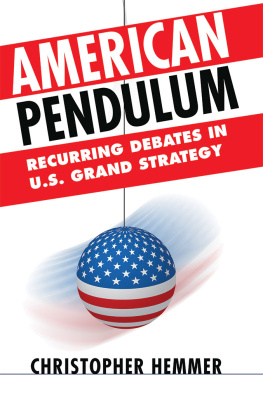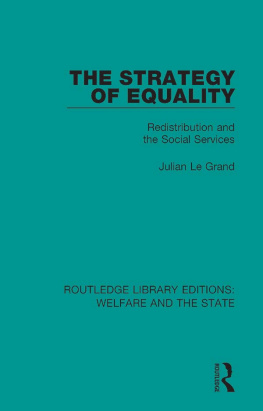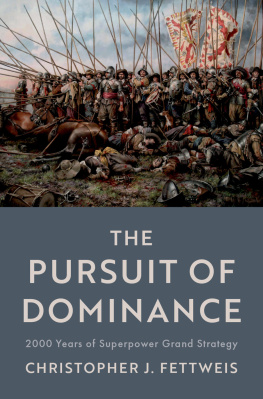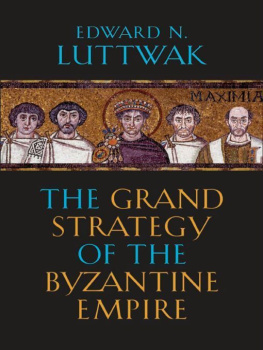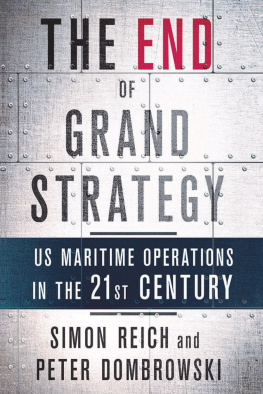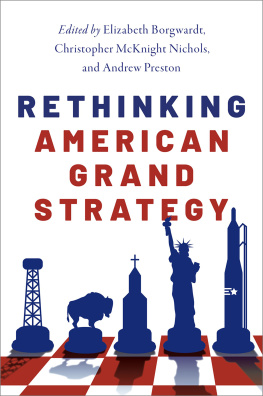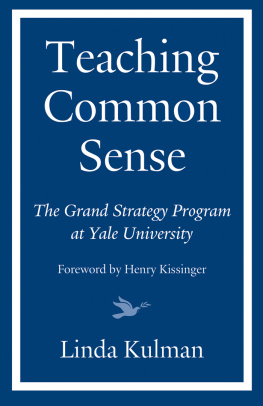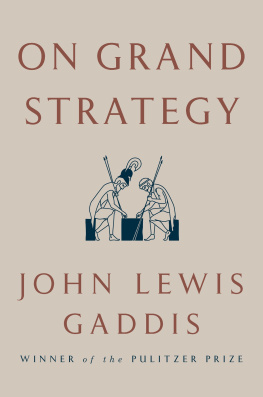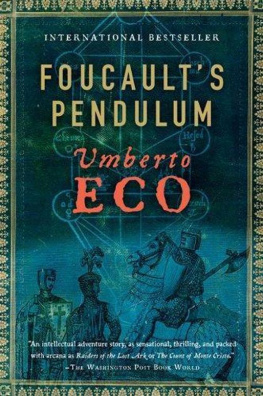Acknowledgments
My first thanks properly belong to my students at the Air War College, especially those who took my U.S. Grand Strategy elective and those who signed up for the Grand Strategy Program/Seminar. Virtually all the ideas contained in this book were first tried out, developed, expanded upon, and refined in our class discussions. I always walked out of seminar smarter than I was when I walked in. My fellow faculty members at the Air War College, especially those in the Department of International Security Studies, also deserve thanks for sitting through more lectures and faculty workshops on this topic than many of us would care to count.
While I hope that my debts to others working in this field are well represented in the footnotes, I would also like to thank some of the best teachers I have had, whose influence may be less apparent but no less important including Tim Borstelmann, Tom Christensen, Jim Goldgeier, Peter Katzenstein, Steven Livingston, and Shibley Telhami.
I would also like to thank everyone at Cornell University Press, including Susan Barnett and especially Roger Haydon, who was enthusiastic about this project from the beginning and expertly shepherded it through to publication. The copy editing skills of Michael Bohrer-Clancy, Sara Ferguson, and Therese Malhame saved me from many errors and greatly improved the prose throughout the book. Thanks as well to the reviewers of the book from the press, especially Robert Jervis who waived anonymity to better provide constructive comments. Unknown to him, this is the second intellectual debt I owe him. When I was an undergraduate struggling to find a topic for my senior thesis, my adviser tried to get me started by asking which of the books in the field had the greatest influence on me. My answer was Jerviss Perception and Misperception in International Politics, a book that provided the launch point for my thesis as well as for many subsequent efforts. Now, many years later, it has been especially gratifying to receive such generous, specific, and helpful comments from him on the draft of this book. My final and most important thanks go to Sandy, Kyle, and Paige. I hope they know why.
Introduction
Recurring Debates in U.S. Grand Strategy
With the coming to power of each presidential administration, observers of U.S. foreign policy often dispute how novel the new teams approach to foreign policy is. Although compelling, such discussions can also be frustrating. No U.S. grand strategy will be completely novel. New presidential administrations never start from a blank slate, so it is always possible to see similarities between an administration and its predecessors. Conversely, because each administration faces novel problems and operates in a unique context, no U.S. foreign policy strategy will be an exact replica of its predecessors. Thus, analysts will be able to identify both continuity and change in U.S. foreign policy. In addition, these debates have little bearing on the substance of foreign policy strategy. Whether a strategy is deemed to be revolutionary, new, modified, or traditional tells us nothing about the merit of that policy. Even if a strategy has a distinguished historical pedigree, that does not mean it is the correct one in current circumstances. Similarly, a revolutionary strategy can be appropriate or inappropriate for the current challenges a country faces.
This book attempts to limit these frustrations by examining the grand strategic choices of the United States through the lens of four recurring debates in U.S. foreign policy. The first debate focuses on how the United States should balance the trade-offs between working alone (unilaterally) and working with other states and international organizations (multilaterally). The second debate focuses on the proper place of U.S. values in U.S. foreign policy. The third debate is about where the strategic perimeter of the United States lies: what parts of the world and what issues must the United States be deeply concerned with and what parts of the world and what issues can it safely ignore? The final debate focuses on the question of whether time is on the side of the United States or that of its enemies. These four debates were chosen on pragmatic rather than theoretical grounds. They represent a manageable number of distinct debates that have run throughout U.S. history and still animate arguments about U.S. foreign policy today. If a better understanding of these four debates, what is at stake in each, and how they have recurred throughout U.S. history, offers a useful way of thinking about the current and future strategic choices of the United States, then the principal aim of this book will have been met.
The history of U.S. foreign policy is not a settled tradition against which one can usefully judge the faithfulness or originality of a given policy. Instead, that history consists of fierce debates regarding the proper course for the United States with policy choices being only a temporary resolution of those debates. This approach shifts the focus from a discussion of how similar or dissimilar a policy is to one of its predecessors to a discussion of how previous debates in the history of U.S. foreign policy might help to illuminate current choices. The key benefit of this altered focus is that it moves the discussion of current U.S. strategy toward substantive issues and away from the perceived degree of fidelity to a historical tradition. The issue is not, for example, how similar the 2002 National Security Strategy is to the foreign policy of John Quincy Adams, but what we can learn from the debates on U.S. foreign policy that took place in the 1820s and the results of the policies that flowed from those debates, which can help us think more clearly about the challenges facing the United States today.
The purpose of this book is not to offer a diplomatic history of U.S. foreign relations.
What Is Grand Strategy?
As Barry Posen phrases it, grand strategy is a states theory about how it can best cause security for itself. only the interests of a substate group, regardless of how those interests are defined, the strategy does not merit the title grand. Conversely, if the intent of a strategy is to advance a states overall interests, regardless of how those interests are defined in practice, then the term grand strategy is appropriate.
A states grand strategy should also be comprehensive. Grand strategy should not focus on a specific issue or a relationship with a particular state; it should focus on how a state wants its place in the world to look. Most states are more concerned with their immediate region than with distant parts of the globe, and more powerful states have a wider purview than weaker states, but a states grand strategy should address every area in which a state sees itself as having important interests.
Grand strategy should also have a long-term focus. It should not just be a plan for today or tomorrow, but a plan that looks to the future. As with national interests, the definition of long term can vary from state to state. One stereotype of the United States is that, either because of temperament or electoral cycles, it wants everything done tomorrow (or even better, yesterday) and it is thus unable to sustain policies over the long term. This stereotype can be misleading: U.S. policymakers have been able to think in terms beyond the next election. In thinking about grand strategy, U.S. policymakers have tended to define the proper grand strategic time horizon in terms of decades.

